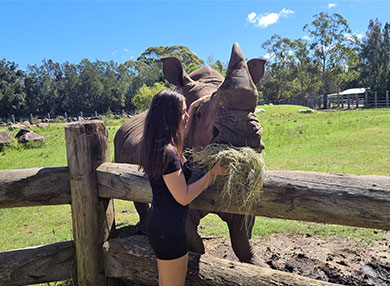Everything that could have gone wrong during my candidature did. But, if everything had gone to plan, I wouldn’t have been able to share my completion with the person who showed me that research could take you to places you dreamed of as a child, and even redefine humankind.

Dr Zara Bending was ten years old, in a public school library in western Sydney, when she saw Dr. Jane Goodall DBE on the cover of a National Geographic magazine. In October 2024, she will graduate with a PhD in law. Her PhD draws on over a decade of real-world experience as a globally recognised expert in wildlife crime.
Dr Bending's PhD investigated rhinoceros horn trafficking. Here she is pictured with one of her favourite rhino, Jabari, at Mogo Zoo on the NSW South Coast.

Dr Zara Bending was touring New Zealand with Dr Jane Goodall when she received her official letter of completion. This photo was taken minutes after by tour photographer Andy Woods.
"Decades after reading about her, my research led me to her Institute, to an Australian Office Board of Directors, and then to the Global Office as a resident expert."
The Faculty Graduate Research Coordinator Dr Ravi Palavalli Nettimi sat down with Zara to chat about her PhD life. Here are her top tips for current graduate researchers.
- Impact is not just about citations. While Zara’s peer-reviewed journal articles have 200+ citations, most of her impact comes through NGO networks and media outreach through venues such as The Conversation. At Macquarie, graduate researchers can engage with the Communications team and contribute to the Lighthouse.
- Don't undersell your expertise and value. Graduate students, especially first-generation graduates, tend to undersell their value. It is important to remember that you are an expert in your field. To gain confidence, engage with others within and outside your department/faculty.
- Use social media to network and learn more about the stakeholders and end-users of your research.
- Learn to tell your story, because people connect to stories rather than dry facts. What challenges did you have and how did you overcome them?
- Use the career services support offered by the university. The Career Services team can help you with job searching, including how to create resumes and ace job interviews.
- Having a good mentor can be invaluable. The mentor does not need to be your supervisor, but anyone who can help you guide through your career journey or even help connect you to suitable contacts.
- Be a good mentee. Having a mentor is not a one-sided relationship. To make the relationship an effective and mutually beneficial one: listen, learn when to follow advice to the letter and when to forge your own approach, and offer to mentor your mentor in something they would like to learn.
- Teaching, whether formally tutoring undergraduates at university or doing outreach with schools or community-based initiatives relevant to your research, will help you learn how to communicate complex ideas simply and engage a wider range of people. TECHE, Macquarie’s Learning and Teaching (L&T) blog, is a great place to find out more about university teaching whether you’re new or keen to invest in teaching development.
In addition to her research, Dr Bending is an award-winning lecturer and mentor. Zara is the recipient of one Faculty of Arts and two Vice-Chancellors Learning and Teaching Awards as well as a national-level citation for teaching excellence from the Australian Awards for University Teaching. Her citation reads “for inspiring the next generation of legal scholars, advocates, and changemakers through holistic mentorship and transformative learning design”. She now volunteers her time as an assessor for the national awards.
Zara is keen to mentor the next generation of graduate researchers from the Faculty of Arts. Feel free to contact her if you are keen.